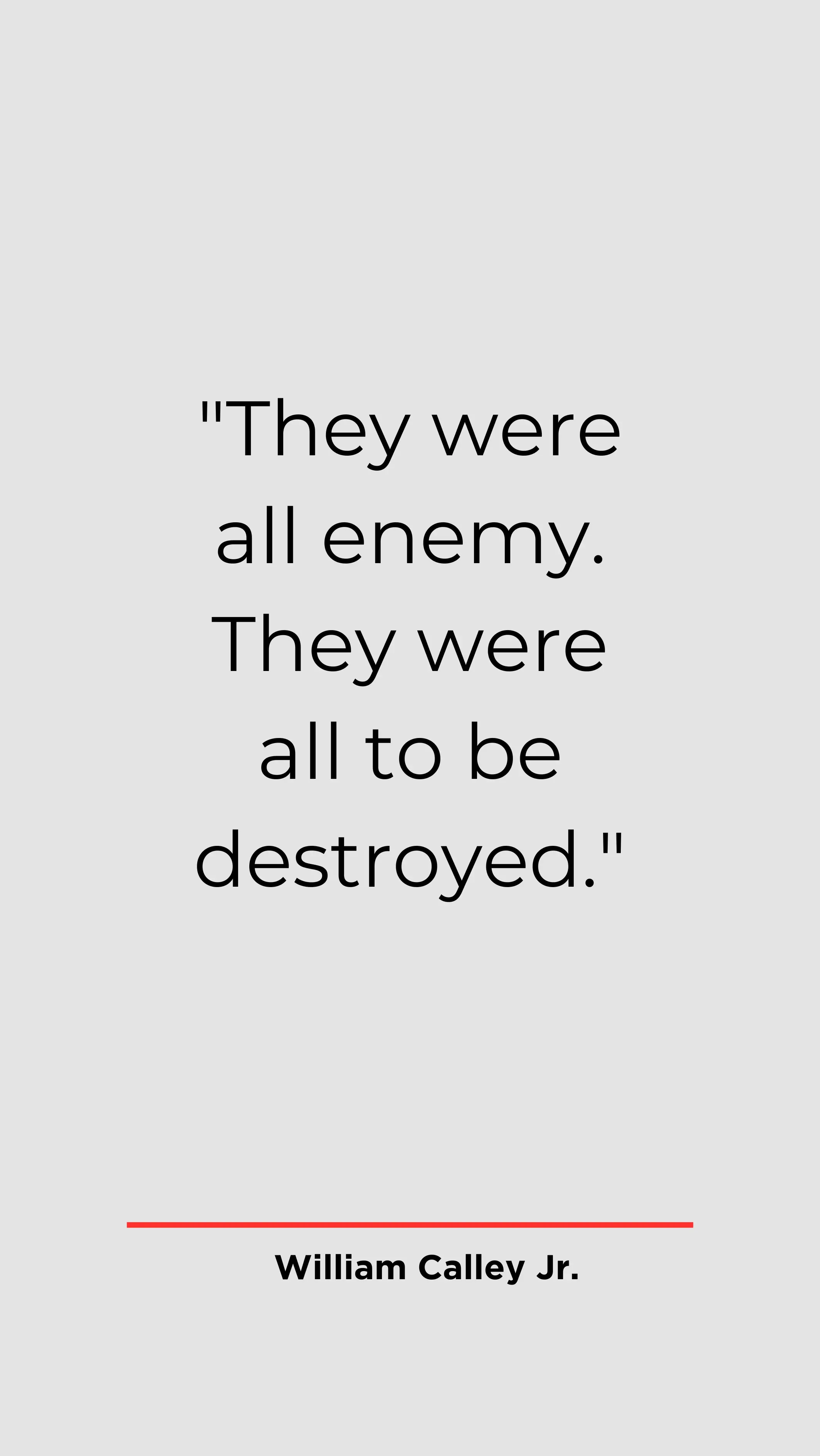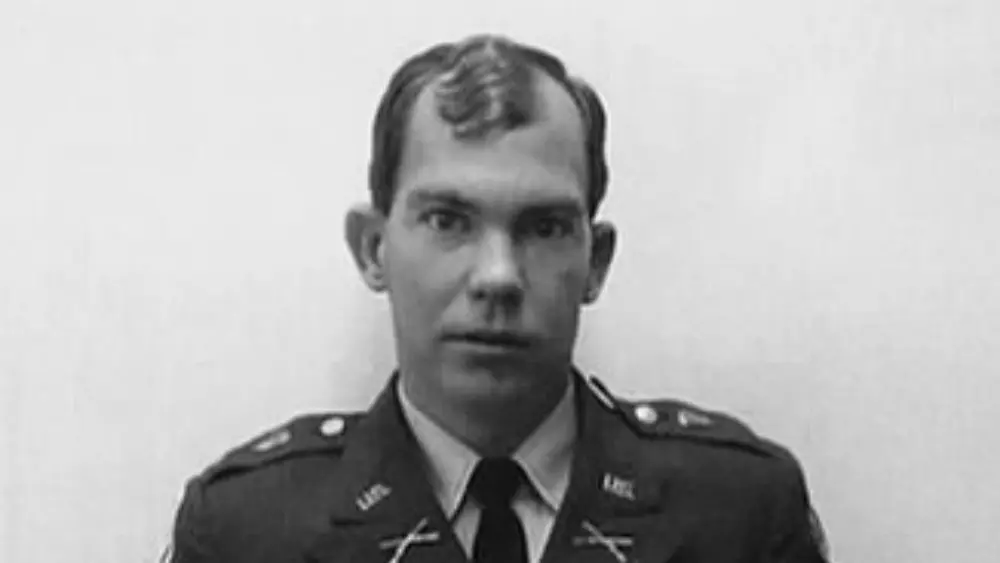William Laws Calley, Jr., born on June 8, 1943, in Miami, Florida, became influential for his role in one of the most tragic episodes of the Vietnam War—the My Lai Massacre. His actions as a young army officer on that fateful day would forever be associated with the dark side of the conflict.
Early Life and Military Career
William Calley’s early life entailed his upbringing in a military family. Born in Miami, Florida, he attended Florida State University before making a significant decision to enlist in the U.S. Army in 1966. Following his enlistment, Calley underwent training and later completed Officer Candidate School, earning a commission as a second lieutenant. This period of his life marked the beginning of his military career, which would soon become deeply entangled with one of the most controversial events in American military history.
Calley’s military service and his subsequent actions during the Vietnam War would cast a long shadow over his life, earning him both notoriety and infamy. His role in the tragic incident known as the My Lai Massacre in 1968 would come to define his legacy and become a focal point of debate and controversy in the years to come.
William Calley Jr.: Deployment to Vietnam
In 1967, Lieutenant William Calley Jr. initiated a fateful journey as he deployed to Vietnam with the Americal Division, a unit designated for operations in the Quang Ngai Province. Little did he know that this deployment would thrust him into the heart of one of the Vietnam War’s most influential and horrifying incidents. The Vietnam War itself was an uproar and divisive period in American history, marked by intense opposition both at home and abroad. Calley’s deployment to the war-torn country would lead to his involvement in a dark chapter that would forever define his legacy.
In the midst of the Quang Ngai Province’s war-ravaged landscape, William Calley Jr. would soon become a central figure in the My Lai Massacre, an atrocity that shocked the world and highlighted the brutality of the war. The events of March 16, 1968, forever stained his name as he and his platoon were responsible for the massacre of over 500 Vietnamese civilians, including women, children, and the old ones. Calley’s role in this tragic incident would ultimately lead to his court-martial, conviction, and a life defined by controversy. His deployment to Vietnam transformed from a routine military assignment into a pivotal historical moment forever intertwined with the horrors of war and the moral complexities of military service during a deeply contentious era in American history.
The My Lai Massacre
March 16, 1968, etched infamy, forever associating it with the horrific My Lai Massacre. On that fateful day, Lieutenant William Calley Jr. led a platoon into the small hamlet of My Lai in Vietnam. Operating under the mistaken belief that the village was harboring Viet Cong fighters, Calley’s unit unleashed a wave of brutality that resulted in the deaths of an estimated 347 to 504 unarmed South Vietnamese civilians, including women, children, and the older ones. This shocking act of violence unfolded during the already deeply divisive and controversial Vietnam War. It would leave a lasting mark on history.
The My Lai Massacre remains a haunting reminder of the moral complexities and horrors of warfare. The world gasped in horror as the full extent of the massacre was eventually revealed, making it a symbol of the devastating toll that war can inflict on both soldiers and innocent civilians. The event sparked widespread outrage, leading to investigations, trials, and a reevaluation of military conduct during the Vietnam War. The My Lai Massacre stands as a stark testament to the capacity for cruelty in times of conflict and serves as a somber lesson in the importance of upholding the principles of humanity, even in the midst of war’s chaos and confusion.
William Calley Jr.: Investigation and Trial
The revelation of the My Lai Massacre in 1969 sent shockwaves through the United States and the world, prompting immediate action. William Calley Jr., the officer in charge during the horrific event, faced a military investigation and subsequent trial for his involvement. Calley’s trial was a pivotal moment, not only in his own life but also in the broader context of the Vietnam War.
During the trial, Calley contended that he had been following orders issued by his superior officer, Captain Ernest Medina. This argument raised profound questions about the moral and legal responsibilities of soldiers during wartime. It forced the court to grapple with the complex issue of whether soldiers should blindly obey orders, even when those orders involve the commission of atrocities. The trial of William Calley Jr. became a symbol of the ethical dilemmas faced by military personnel in the field, and it prompted a national debate about the limits of obedience in the face of moral wrongdoing.
Conviction and Controversy
In a landmark legal decision in March 1971, William Calley Jr. was found guilty of the murder of 22 South Vietnamese civilians and subsequently sentenced to life in prison. However, Calley’s conviction was far from straightforward and was shrouded in controversy. Many individuals and organizations across the United States and beyond contended that Calley had become a scapegoat for the wider failures and atrocities of the Vietnam War.
The crux of the controversy lay in the argument that Calley was merely following orders, operating in a conflict characterized by ambiguous rules of engagement. Critics of his conviction argued that the responsibility for the My Lai Massacre should extend beyond one individual, given the broader context of the war’s brutality and the challenges faced by soldiers on the ground. Calley’s case became emblematic of the profound moral and ethical questions raised by the Vietnam War, sparking debates about accountability, military conduct, and the nature of war itself. His conviction remains a divisive and complex chapter in American history, serving as a reminder of the enduring ethical dilemmas associated with armed conflict.
William Calley Jr.: Legal Appeals and Commutation
After his initial conviction, William Calley Jr. embarked on a legal journey that saw his sentence gradually reduced. On appeal, his life imprisonment sentence was reduced to 20 years, and eventually, Calley served only three and a half years under house arrest. In a subsequent development, in 1974, his sentence was further shortened to 10 years. This legal rollercoaster surrounding Calley’s punishment only deepened the divisions within public opinion.
Throughout these legal proceedings, public sentiment remained deeply divided. For some, Calley’s reputation labeled him a war criminal, assigning responsibility for the heinous acts committed during the My Lai Massacre. Others, however, viewed him as a symbol of a deeply flawed military strategy during the Vietnam War, arguing that he was a product of a chaotic and morally ambiguous wartime environment. The case of William Calley Jr. remains a poignant and contentious chapter in the broader narrative of the Vietnam War, provoking ongoing debates about the accountability of individuals in times of war and the complex interplay between military orders and individual responsibility.

Post-Release Life
Following his release from house arrest and his shortened prison sentence, William Calley Jr. chose to lead a quiet and private life away from the public eye. With the controversial chapter of the My Lai Massacre behind him, Calley sought to distance himself from the notoriety and scrutiny that had defined much of his post-conviction years. Instead, he transitioned into the realm of civilian life, taking on various roles in sales and management.
For the most part, Calley remained outside of the public spotlight, living a life far removed from the intense media attention and public discourse that had surrounded his case during and after the Vietnam War. His decision to maintain a low profile represented a significant departure from the unruly and divisive period of his military service and legal proceedings, allowing him to seek a semblance of normalcy and privacy in the years that followed.
William Calley Jr.: Legacy
William Calley Jr. remains a deeply polarizing and controversial figure in American history. His involvement in the My Lai Massacre remains one of the most influential and troubling episodes of the Vietnam War. It has left a lasting mark on the nation’s collective memory.. The massacre not only exposed the horrors of war but also forced a reckoning with the ethical dilemmas surrounding military conduct in times of conflict. Calley’s actions and subsequent legal proceedings raised profound questions about the moral responsibility of soldiers in wartime, the complex dynamics of following orders, and the enduring legacy of atrocities committed during the Vietnam War.
Calley’s legacy starkly reminds us of the complex and morally challenging nature of warfare, where the lines between right and wrong blur, and individuals grapple with the consequences of their actions long after the conflict ends. His case remains a subject of historical debate, sparking discussions about the accountability of those involved in wartime atrocities and the lasting impact of such events on the individuals involved and the societies they represent.











